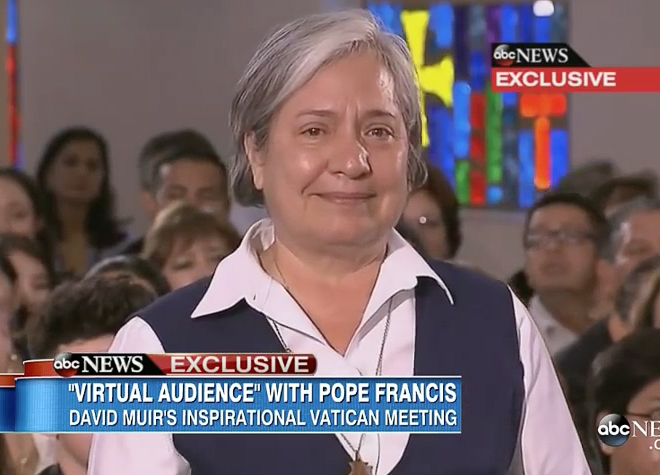Pope Francis confessed his love for a woman—for many women, actually—on national television this month.
After talking with immigrant families in McAllen, Texas on the ABC 20/20 special episode “Pope Francis and the People,” Pope Francis asked to speak with a Catholic sister he saw “hidden there among all the people” in the pews—Sister Norma Pimentel (start at 1:48 for that moment).
He thanked Pimentel—and all women religious in the United States—for the work they do, then said, “I’ll tell you one other thing. Is it appropriate for the pope to say this? I love you all very much.”
That a pope would love Catholic sisters doesn’t seem too surprising, but considering the recent relationship between sisters and the male church hierarchy, his funny, endearing statement carried a great deal of meaning.
Catholic sisters—in line with the causes this pope has brought to the fore—are committed to living out the gospel message of feeding, clothing and caring for the poor and most vulnerable. They lead the way on environmental issues, human trafficking, immigration and poverty.
Moreover, Catholic sisters respond to these issues with the “closeness” that Pope Francis says is important to him. Indeed, ABC showed Pimentel, executive director of Catholic Charities of the Rio Grande Valley, greeting immigrants with applause and hugs. Grounded in a deep sense that each person is made in the image of God, Catholic sisters’ service is personal and heartfelt.
But this media moment also comes after more than half a decade of Vatican investigations into U.S. Catholic sisters. These investigations—into orders of women religious in the United States and the Leadership Council of Women Religious—started under Pope Benedict in 2008 and 2009.
Though Pope Francis’ rhetoric may have given sisters some hope, these two processes continued well into his papacy. The report on religious orders wasn’t released until December 2014, and a bishop oversaw LCWR’s activities until April 2015.
The final report on religious orders was conciliatory, repeatedly thanking sisters for their service while providing critiques of both religious orders and the church. It noted sisters’ “desire for greater recognition and support of the contribution of women religious to the Church on the part of its pastors.”
The Center for Religion and Civic Culture at USC (where I work) has been studying the roles that sisters play across the world. When my colleagues interview sisters, they often talk of working with diocesan officials as a “challenge.” This includes conservative, habited sisters that don’t fall under LCWR—and sisters in Africa. Moreover, the support of the hierarchy often plays an instrumental role in enabling sisters to carry out their ministries.
I saw this with sisters in Italy, too. When I visited a shelter for trafficking victims there, Sr. Rita Giaretta showed off a picture of her local bishop and Pope Francis with pride. Without the support of her bishop, her ministry wouldn’t exist. He invited the sisters to his diocese and gave them the space to figure out the people’s most urgent needs and how they could respond. Francis’ commitment to combatting human trafficking keeps her motivated.
But at the cooperative where survivors sewed goods, Giaretta seemed more interested in speaking to my translator than to me. My translator frequently worked for religious orders in Rome (when I met her for the first time near the Vatican and asked her about her experience, she casually said she had just spend three hours translating for the pope). Giaretta complained to her that the institutional church wanted nothing to do with her ministry. She had repeatedly asked priests and other orders of religious to support the cooperative by purchasing its goods with little success. My translator brought home a tote bag advertising the NewHope Cooperative to carry around the Vatican.
While Catholic sisters are certainly selfless, neglect can make anyone feel underappreciated.
For American women religious, the investigations into their lives exacerbated the hurt. Some, in fact, would have appreciated an apology.
“The Vatican doesn’t do apologies,” Sacred Heart Sr. Jean Bartunek, a Boston College professor who studied the visitation told Global Sisters Report when the investigations’ report was released last year.
But if Pope Francis can’t say “I’m sorry,” then perhaps “I love you” will suffice for now. Regardless of the past, it affirms the lives and work of the sisters.
“Be courageous. Move forward. Take the lead—always,” Pope Francis said.
Sister Simone Campbell never stopped leading. In 2012, the Vatican’s report on LCWR specifically called out her organization NETWORK, the Catholic social justice lobby, as part of the problem due to its role supporting the Affordable Care Act.
Taking advantage of their newfound notoriety, Campbell and other sisters crossed the country as the “Nuns on the Bus.” As she notes in her memoir, their goal was not only to protest proposed budget cuts to social services, but also “to lift up the work of our sisters.”
It’s notable that a journey that started out of censure is now pointed in the direction of Pope Francis. This year’s “Nuns on the Bus” tour starts in St. Louis this week and ends in Washington, D.C., in time for the start of the papal visit on September 23.
Its theme, “bridge the divide,” refers to the political divide in our country, but the trip also speaks to the need for healing between sisters and church leadership.
“Obviously, Pope Francis’ message is exactly what we’ve been doing for 43 years,” Campbell told Religion News Service. “Having that affirmation is hugely supportive.”
Campbell said she would continue her work, no matter what the church hierarchy says. But for now at least, this pope is sending the message that he is on the bus, riding with them.





